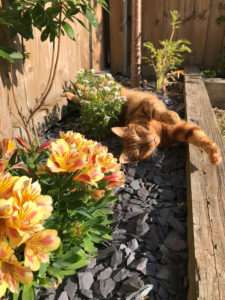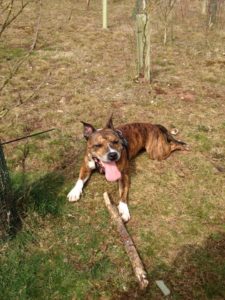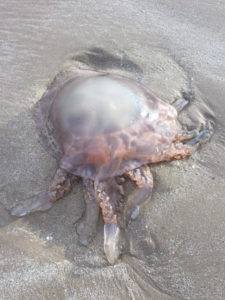SUMMER Toxins
With the warm weather persisting it’s time to remind people of the SUMMER TOXINS our much loved pets should avoid.
In the Garden
Slug Baits: to avoid vegetation and flowers being destroyed many people apply slug baits to their gardens. There are different types of slug bait but the most toxic are those containing metaldehyde; this can rapidly cause neurological signs such as tremors, twitching and seizures. Others can contain methiocarb which can cause excessive salivation, tearing and urination, it can also cause respiratory difficulties, vomiting and diarrhoea. Lastly, those containing ferric phosphate can cause gastrointestinal signs and although low risk, iron toxicity can occur.
Choosing animal friendly and organic alternatives in your own garden is the best prevention but wandering cats and foraging dogs may still be at risk of exposure so it is important to avoid any if you see it (often grey-blue-green pellets) and recognise the associated signs. If your pet ingests slug bait phone us immediately.
Insecticides: there are lots of other products for lots of other bugs in our gardens; ants, aphids, fly sprays etc and to limit our pets exposure ensure the manufacturers instructions and guidance are followed.
 Lawn Products: we suspect nobody is trying to revive their lawns just yet but please be careful with such products as these too can affect our pets.
Lawn Products: we suspect nobody is trying to revive their lawns just yet but please be careful with such products as these too can affect our pets.
- Fertilizers. Although relatively low toxicity these can cause gastrointestinal upset and skin irritation on contact.
- Weed Killers. Glyphosate is a common weed killer and is often formulated with a detergent to improve its efficacy. Glyphosate products are irritant resulting in hypersalivation, vomiting and diarrhoea but also potentially neurological signs and a slow heart rate. The detergent part of the product can also be an issue, more so in cats who can suffer from breathing difficulties and pneumonia following ingestion.
- ‘Feed and weed’ combined products. These products contain the above but also iron to kill moss. The risks therefore are as above including iron toxicity.
BBQ Equipment: Ensure BBQ light fluid is stored safely away from animals as it can be irritant to the skin and eyes causing inflammation and burns. If ingested it can cause oral ulceration, vomiting and breathing difficulties.
As an aside – make sure left over food is not lying around. Corn on the cobs seem to be a particular favourite of dogs and unfortunately commonly get stuck in the intestines rather than coming through.
Patio Cleaners: Some of these cleaners contain benzalkonium chloride. Exposure to this can cause oral inflammation, ulceration and excessive salivation. Your pet may develop a temperature and such effects can be delayed by several hours. It is important to store such cleaners safely and ensure our pets cannot access the area during its use.
Compost Heap: if you have a compost heap ensure your pet is unable to gain access to it. This is because some of the moulds they contain can produce toxic compounds. If ingested this can cause tremors and convulsions.
Out on walks
 Bees and wasps: Stings from these can cause pain and swelling although most of our pets don’t learn from this experience! However, sometimes this can be extensive and allergic reactions can occur in some individuals resulting in collapse and difficulty breathing. These patients are an emergency and must be brought to a vet immediately. In the case of multiple stings there can be a slightly delayed effect on the kidneys and liver so veterinary attention is advisable in this situation too.
Bees and wasps: Stings from these can cause pain and swelling although most of our pets don’t learn from this experience! However, sometimes this can be extensive and allergic reactions can occur in some individuals resulting in collapse and difficulty breathing. These patients are an emergency and must be brought to a vet immediately. In the case of multiple stings there can be a slightly delayed effect on the kidneys and liver so veterinary attention is advisable in this situation too.
Blue-green algae: Hot and dry summers are ideal for blue-green algae to bloom in lakes and ponds. It is particularly important to look for algae before allowing your pet to swim outdoors and ensuring you keep your dog on a lead before you make this assessment. Helpfully, warning signs are displayed in some areas so keep a watch out for these too. The algae, also described as cyanobacteria has many different types and some are more toxic than others. Some are irritant to the skin, others can cause liver and kidney damage whilst others affect the brain resulting in tremors, paralysis and breathing issues. In severe cases the cyanobacteria can be fatal within the first few hours. If your pet has swam in an affected area try to rinse their coats with fresh clean water and contact your vet immediately.
Mouldy foods: Discarded food and leftovers can be found out walking and in this heat the food becomes mouldy quickly. Toxic substances produced by the mould, particularly of bread and dairy can cause vomiting, high temperature, tremors and convulsions. It’s not easy, but try to keep an eye on what your pet is eating whilst out walking and ideally keep them on a lead if such hazards are around.
Adder bites: Adders are the only venomous snake from the UK but will only attack if provoked. They are a protected species and should be left in their environment if found. Adder bites can however be very serious in animals, their venom causes rapid swelling and pain locally progressing to lethargy and collapse. Immediate action is required in order to maximise response and recovery.
At the Beach
 Seawater: Due to the high levels of salt (sodium chloride) excessive ingestion of sea water can lead to a high sodium concentration in the blood. Your pet may become extremely thirsty but also exhibit vomiting, diarrhoea and lethargy. With extremely high blood concentrations there is a risk of convulsions and coma.
Seawater: Due to the high levels of salt (sodium chloride) excessive ingestion of sea water can lead to a high sodium concentration in the blood. Your pet may become extremely thirsty but also exhibit vomiting, diarrhoea and lethargy. With extremely high blood concentrations there is a risk of convulsions and coma.
Jellyfish: even dead jellyfish can sting so be vigilant whilst your dog is in and out of the water. Ingestion or even licking a jellyfish can result in clinical signs. These can range from vomiting, swelling and pain at the site of contact, a high temperature and breathing difficulties.
Prevention is key but we understand our pets get themselves into all sorts of mischief so if you are concerned about toxin ingestion then please phone us straight away so we can give you the best advice possible. If possible and safe to do so it can also be useful to bring any relevant packaging/containers. Our number is 01606 880890
